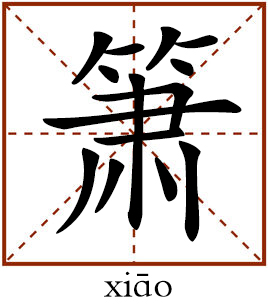xiao

This character refers to a Chinese end-blown bamboo flute noted for its mellow and melancholy tone. In terms of its calligraphy, the two graphical components of xiao denote bamboo and the sounds of wind. Xiao originally referred to a bamboo flute, playing sounds like wind. In Chinese culture, the xiao is often regarded as a poetic symbol.
箫韶九成
xiāo sháo jiǔ chéng
Xiao is the Chinese flute and Shao is the name of the music of Emperor Shun (c. 2128–c. 2025 BCE). Jiu cheng refers to nine chapters of music. This proverb usually refers to music when it is perceived as quite beautiful.
The proverb comes from one of the Five Classics of ancient Chinese literature, Shang Shu (The Book of Documents). It stated that upon hearing nine chapters of the Shao music played with the xiao, a phoenix was enticed by the music and flew to its source. In Chinese culture, the phoenix, together with the dragon, is regarded as one of the most sacred animals and it symbolizes virtue and grace. The ancient Chinese believed that the phoenix rarely appeared. If a piece of music is able to attract a phoenix, it must be extremely beautiful and touching.
玉人何处教吹箫
yù rén hé chù jiāo chuī xiāo
Yu ren refers to beautiful lady and he chu means “where.” Jiao is “to teach” and chui xiao means “to play a xiao flute.” The term, taken literally, means, “where are you teaching the beauties to play xiao?”
This term is a verse from a poem named “Composed to Han Chuo, An Officer of Yangzhou” by the Tang poet, Du Mu (803–852). “When the moon that is bright, is shining over the twenty-four bridges at night,/ Where is the one who is teaching the singing girls to play the flute, charming and slight?” Du once worked in Yangzhou and became a friend of Han Chuo. After he left Yangzhou and returned to the north, he sent this poem to Han, expressing his nostalgic longing for Yangzhou as well as how he missed his friend. Du joked with Han by asking him where he was teaching the girls to play xiao, reminding him of the old times that they spent together.
(edited by REN GUANHONG)

 PRINT
PRINT CLOSE
CLOSE